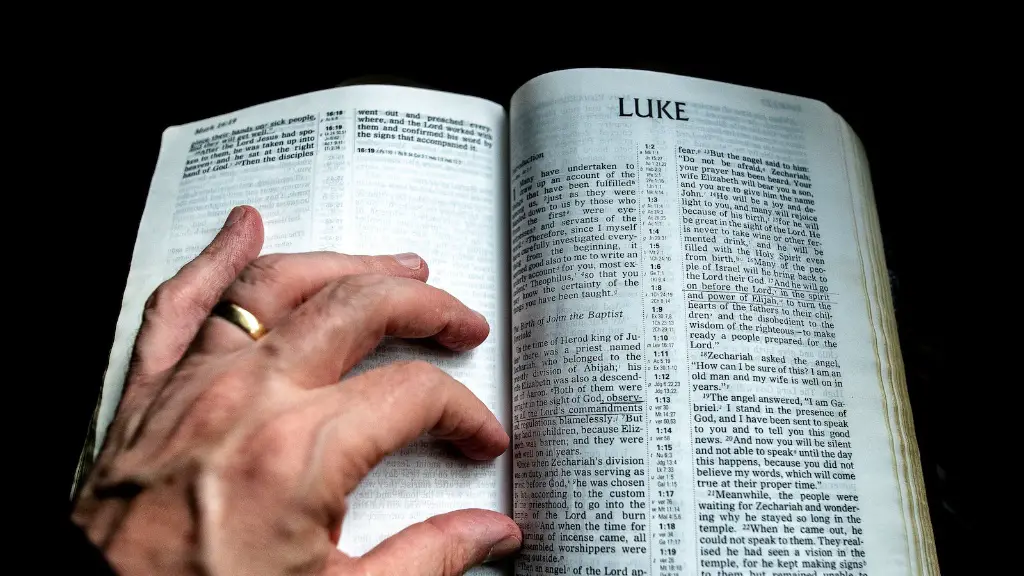What books went into the Bible and why, is a question that has been asked and debated for centuries. The Bible, composed of 66 books in total, is divided into two parts; the Old Testament and the New Testament. Both of these parts, as compiled by Jewish and Christian theologians, focus on the spiritual, moral and historical record of mankind, from the time of Moses until close to the end of the first century AD.
The books in the Bible were written by 40 different authors, across numerous cultures and eras, over a period of many centuries. This is why deciding what went into the Bible was not a simple task. Ultimately, it was decided by the canon of the Catholic church, based on criteria that the church had developed over time. Canon law is the set of rules and regulations that dictate what books have been accepted as inspired by God and which must be excluded from the canon. It helps to determine which books of the Bible are regarded as sacred, and which are not regarded as a part of the religious teaching.
The early Christian church used the same books that were in the Septuagint, the Greek translation of the Hebrew scriptures, as the basis for their canon. It was believed that these books were inspired by God as revealed in the Old Testament, and these books were accepted as authoritative. In addition to this, the early Christians believed that Jesus and the apostles were the final authority in interpreting Scripture and discerning which books should be included in the canon. The New Testament was therefore decided upon by the early church fathers, based on the Gospels and the writings of the apostles, as well as the letters of Paul.
The early church fathers were very aware of how difficult it would be to decide which books should be accepted or rejected. To help ensure that the right decision was made, they adopted specific criteria. Firstly, the books had to agree with the teachings of the apostles, so that any book which contradicted the teachings of the apostles was rejected. Secondly, the books had to be written by the apostles or their disciples, so that only those books written by them were accepted. Lastly, books had to have been written within a time frame that would be consistent with the time when Jesus was thought to have lived, so that only those books which were written within that time frame were accepted.
When it came time to determine which books would be included in the Bible, there was a lot of debate and disagreement. However, by the fourth century AD the Catholic church had largely come to a consensus about which books should be included. This process was further formalized in the Council of Trent in 1546, when the books of the Bible were officially recognized as the inspired Word of God.
Since then, the books of the Bible have been reprinted and translated countless times, with the end result being that the Bible is still regarded as one of the most important religious documents in the world. So, who truly decided what books went into the Bible? In the end, it was a combination of the early Church Fathers and the Church’s canon law that made the final decision.
Context of Scripture
How the Scriptures were regarded in the Ancient Near East is an important factor in understanding why certain books were included in the Bible. Within the Ancient Near East were two dominant religious systems; the Hebrew faith and the Greek faith. Both of these religions produced writings that were regarded as sacred to their respective beliefs. The Hebrew scriptures were collected in what is called the Torah and the Prophets, while the Greek scriptures were the earliest Christians writings.
However, the early Church Fathers did not accept all of the books as equally valid. They recognized that some of the writings, particularly those of the Greeks, were not divinely inspired and were instead relying on human interpretations. The books of scripture that were accepted by the early Church Fathers were those which held the most authority within their respective religious systems. As a result, only the most authoritative and recognized books from the Hebrew and Greek scriptures were included.
Development of Canon Law
In addition to the context of scripture, the development of Canon law was important in determining what books should be included in the Bible. Canon law is the set of laws, taught and believed by the Church, that formally recognize certain books as being inspired by God. Canon law helps to determine which books are accepted by the Church as God’s Word, based on such factors as the historical backdrop of the book, the authorship and date of the book, and the accuracy of the teachings contained within it.
Over time, the Church developed a formal process for deciding what books should be accepted as inspired, and which ones should be discarded. Each book was examined to ensure that it was consistent with the teachings of the apostles and contained no apparent errors or contradiction. Through this process, the list of books that makes up the Bible was formed.
Analysis and Critique
The process of deciding which books to include in the Bible has been a subject of great debate, particularly in academic circles. It is important to note that the criteria for canonization has varied, and is still changing in some respects. For example, there has been some debate about the feasibility of and rationale for including the so-called “New Testament Apocrypha” in the Bible.
It has also been argued that canon law has been used to exclude some books, such as the Gospel of Thomas, that could be regarded as worthy candidates for canonization. Furthermore, it has been suggested that the Church has been biased in its selection criteria, and that this has resulted in an incomplete Bible.
The process of deciding which books went into the Bible is an incredibly complex one, and the decisions that were made had a significant impact on the development of Christian theology. It is clear that the early Church Fathers and the Church’s canon law were instrumental in the decision-making process, and it is important to recognize the contributions they made in shaping the Bible as we know it today.
Election of Books
The election of books is another factor that determines what goes into the Bible. This process, also known as selection or reception, refers to the recognition of certain books as authoritative sources for teaching, worship, and the life of the Christian church. During the time of the early church, books were examined to determine if they agreed with the teachings of the apostles and revealed the apostolic tradition. If a book agreed with these criteria it was accepted into the canon of the Church.
One of the main methods used to evaluate books was that of apostolicity. This concept refers to whether a particular book was written by an apostle or a disciple of an apostle. The Church believed that only books written by the direct authority of the apostles, or those that clearly reflected the teachings of them, were trustworthy and should be included in the Bible. As a result of this, certain books that were in circulation, such as the Gospel of Thomas, were not accepted due to a lack of apostolic authorship.
Other books, such as the Gnostic Gospels, were found to be in disagreement with the teachings of the Church and were thus excluded. It was believed that if a book did not adhere to the teachings of the apostles, then it should not be included in the Bible. This process of selection was also dependent on the time period and location, as books written in one region may not have been accepted in another.
Translation and Transmission of Bible
Once the books of the Bible were accepted and assembled, it was essential to ensure accurate transmission and translation of the books over time. To ensure that no errors or alterations were made in the transmission process, the Church employed various techniques. For example, the Church would check manuscripts to detect any changes or discrepancies. Additionally, the synagogue and Church both had scribes that were responsible for transcribing the original Hebrew and Greek versions of the Bible, as well as translating them into other languages.
This was an important process, as it ensured that the books included in the Bible would maintain accuracy and consistency. It was also important to ensure that translations of the Bible were accurate and faithful to the original language and intent of the authors. The Church also employed several methods for verifying the accuracy of translations, such as comparison with manuscripts, consulting with experts in the languages, and researching the textual context of the verses in question.
Finally, the Church also developed methods to ensure that the Bible was preserved and transmitted accurately over time. Much of this process relied on the establishment of standardized editions of the Bible, as well as the preservation of manuscripts in libraries and repositories. Though it is impossible to ensure complete accuracy, the Church took great lengths to ensure that the books in the Bible were accurately preserved, translated, and transmitted over time.
Influence on History
The Church’s decision to include certain books in the Bible has had a tremendous impact on history. For example, all of the major religions, including Christianity, Judaism, and Islam, draw from the Bible, both the Old and New Testaments. The books of the Bible provide spiritual guidance, moral instruction, and historical accounts that have shaped and influenced many cultures, societies, and people.
Additionally, the Bible has served as a source of comfort and inspiration for millions of people around the world. Through its stories, teachings, and wisdom, the Bible offers insight and hope to countless people, and its influence has extended beyond just the religious realm. It has been used as a tool to inspire social movements, spur dialogue, motivate change, and build bridges between diverse communities. As such, the impact of the books in the Bible is still significant and far-reaching.
The complex process of deciding which books should be included in the Bible is one that has been endlessly debated and discussed over time. From the context of scripture, to the development of canon law, and the election of books, the criteria for inclusion was wide-reaching and took into account many factors. The impact of the books in the Bible are still felt today, as its stories, teaching, and wisdom have reached across the world and spanned centuries.





